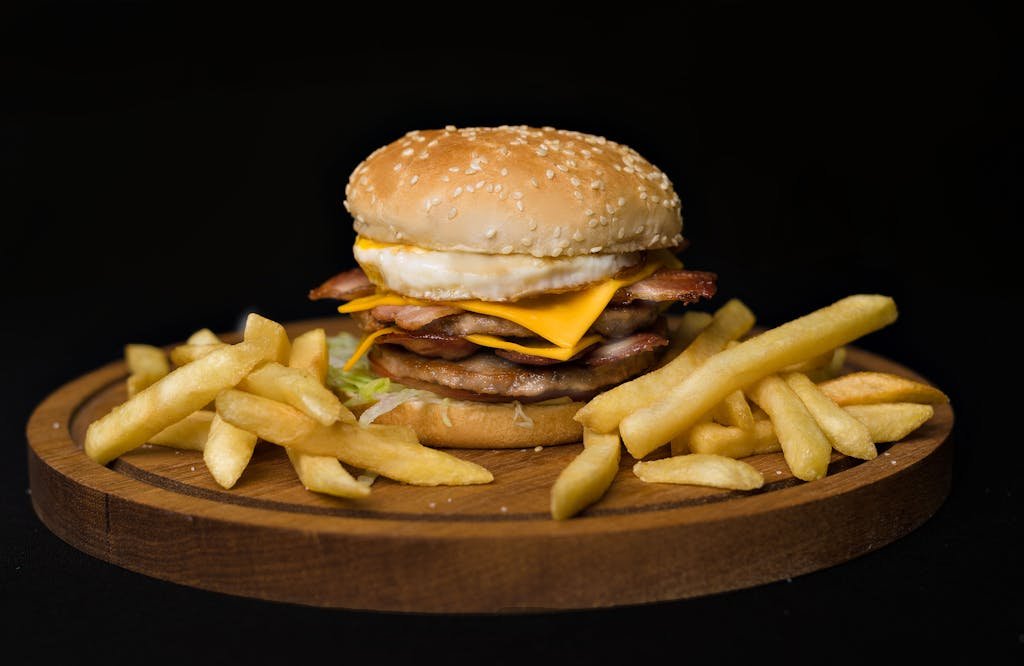Ah the old, “I’m bulking bro” mentality. Do you think you need to become gluttony embodied in order to reach your muscle building gaols? News flash…. How many calories for gaining muscle? Not as much as you think. Do read on.
Building muscle starts with one simple truth: you need to eat more than you burn. That extra fuel—known as a calorie surplus—gives your body the energy it needs to repair and grow stronger after tough workouts. But how many extra calories are enough?
Turns out, it’s not the same for everyone. Your metabolism, activity level, and body type all play a role. Some people might only need an extra 300 calories a day, while others could need closer to 1,000. It’s all about finding the right balance to build muscle without adding unnecessary fat and going down the old school dirty bulk route! one thing is for certain, many people would cease to find muscle building as complicated if they simply ate enough calories and protein!
“Muscle building isn’t about eating everything in sight—it’s about eating smart and training hard.”
— Dr. Eric Helms, Researcher in Exercise Science and Nutrition
FAQs
1. How many extra calories should I eat daily to build muscle?
Most people need a calorie surplus of around 250–500 calories per day to build muscle effectively. Beginners can lean towards the higher end, while more advanced lifters should stick to the lower end to minimise fat gain.
2. Can I build muscle without gaining fat?
It’s nearly impossible to gain pure muscle without some fat. However, by maintaining a small calorie surplus and following a progressive training programme, you can maximise muscle gain while keeping fat gain minimal.
3. Is it better to bulk fast or slow for muscle growth?
A slower, controlled bulk (adding 0.25–0.5kg or 0.5–1lb per week) is ideal for lean muscle gain. Rapid bulking often leads to excessive fat gain, making cutting later more difficult.
4. Do I need to eat carbs to build muscle?
Carbs are not essential but can improve workout performance and recovery by replenishing muscle glycogen. A balanced approach with adequate protein and healthy fats works best, but lower-carb diets can still support muscle growth.
5. How important is protein timing for muscle gain?
While total daily protein intake is most important, spreading protein across 3–4 meals and including a serving before bed can optimise muscle protein synthesis and recovery.
A Quick Piece Of Advice Before Looking To Gain Muscle
If you’re currently over 15% body fat, I’d recommend you cutting your body fat to 10-12% prior to sole focusing on building muscle. here are the reasons:
- Testosterone will be higher at this body fat level. Excess body fat creates an estrogenic environment and makes muscle building more challenging
- If you start lean bulking at a higher body fat you’ll look no more visibly appealing. see my Hollywood physique article for a detailed explanation.
- You can stay in a surplus for far longer (muscle building takes time and contrary to your favourite influencers bull crap, there are no short cuts). Providing you follow the guidelines below, you’ll gain minimal fat and when you’ve finished adding muscle, you’ll still look visibly impressive at a healthy body fat level.
in addition to my free guide for a subscription, you’ll find many fat loss articles scattered throughout the website.
Higher body fat levels can impair testosterone production, making muscle gain less efficient.”
— Dr. Thomas O’Connor, Men’s Health Expert and Endocrinologist
Understanding the Basics of Muscle Growth
When it comes to building muscle, there’s no magic shortcut—it boils down to science and consistency. Your body isn’t just going to stack on muscle because you hit the gym once. It needs fuel, repair, and the right balance of nutrients to transform hard-earned workouts into visible gains.
What Is a Calorie Surplus?
Imagine your body as a bank account. If you’re always withdrawing energy (calories) and never depositing enough back, your muscles will struggle to grow. A calorie surplus is simply eating more calories than your body burns in a day. This creates an “energy reserve” that your body can dip into for muscle repair and growth.
I spent years afraid to eat in a calorie surplus worried that I’d lose my abs! Your body cannot build excess muscle without an energy surplus, it’s that simple! Ignore this fact and you’ll end up in a perpetual permacut mode…. essentially your body will stay the same from here until eternity.
To gain muscle, you need to shift that balance into a surplus. But don’t go overboard—eating far too much can lead to fat gain rather than muscle. your body only needs a slight surplus to put the energy to good use. Eat too much and you’ll fatten!
A small, consistent calorie surplus is far more effective for lean muscle gain than aggressive overeating.”
— Alan Aragon, Nutrition Researcher and Fitness Author

How Muscles Utilise Calories
So, how does your body actually use those calories after you’ve crushed your workouts? When you lift weights or do resistance training, you’re essentially creating tiny tears in your muscle fibres. These need to grow back bigger and stronger.
Here’s where your calorie surplus comes into play:
- Carbohydrates replenish glycogen stores, providing energy for workouts and recovery.
- Fats support overall health and help hormones that assist with muscle repair.
- Proteins? Well, they’re the bricks and mortar of muscle repair (but we’ll get to that in the next section).
In simple terms, your body uses these “extra calories” to fix damaged muscle tissues, making them bigger and stronger over time. Skip the surplus, and as I’ve mentioned above, you’ll never grow bigger and stronger.
Muscle hypertrophy depends on providing your body with the right amount of energy—not just lifting heavier.”
— Brad Schoenfeld, PhD, Muscle Hypertrophy Researcher
Importance of Protein in Muscle Gain
When it comes to muscle-building nutrients, protein reigns supreme. Why? Protein is made up of amino acids, which are your body’s building blocks.
Experts recommend consuming 1.6 to 2.2 grams of protein per kilogram (1 gram of protein per pound of bodyweight) of your body weight per day. That’s because muscle growth only happens when your body has a positive nitrogen balance—basically, you’re consuming more protein than your body breaks down.
But here’s the thing: it’s not just about eating a huge steak once a day. Timing matters (but not as much as we once thought…. 6 small meals a day bro…). Consuming smaller amounts of protein (20-30 grams) every 3-5 hours helps optimise muscle protein synthesis throughout the day. Want to go the extra mile? A hit of protein before bed has been shown to promote overnight muscle repair.
It’s total daily protein intake that drives muscle growth, not how frequently you eat.”
— Alan Aragon, Nutrition Researcher
When I started training many moons ago, it was gospel to eat 6 meals a day to keep your ‘metabolism revved up’ and your precious gains protected. the moment I put the weight down after my last set, I’d furiously sprint for my gym bag and chug down my protein to maximise my ‘ anabolic window’.
Most of these myths have largely been dispelled with science. meal frequency doesn’t really impact muscle growth and it’s okay to wait more than 30 seconds after training for your protein kick. that said, if muscle and strength are your goals, there’s merit to ensuring your eating fairly frequently (3 square meals or 4 a day, with plenty of protein will do it). Ultimately, if your calorie and protein goals are being met, don’t sweat the remainder too much.
Protein intake is the single most important dietary factor for gaining lean muscle mass.”
— Layne Norton, PhD in Nutritional Sciences

Want to make the most of your protein intake? Eggs and meat are your best bet (you’ll get the double whammy of testosterone friendly fats within the eggs- it’s 2025 and these little powerhouses are no longer demonised..
Easy Calculation Of How Many Calories For Muscle gain
Knowing how many calories should I eat for gaining muscle, is a key question to answer if your goal is building muscle effectively while minimising fat. You’ll find many laser focused methods online. On this website I like to keep things simple and effective for you. By using the below multiplier calculation, I’ve managed to satisfy my muscle building and fat loss goals for years. You’ll find similar calculation methods within my vast fat loss articles and my free fat loss guide for subscribing to this website.
Sometimes simplicity is key, especially for those of us with busy lives (all of us eh?).
Complex nutrition plans often fail because they’re unsustainable. Simplicity and consistency win.”
— Martin Berkhan, Nutrition Coach and Creator of LeanGains
Step 1: Calculate Your Multiplier
Your simply going to take your current bodyweight in lbs and multiply it by a number below
Step 2: Calculating How Many Calories For Muscle Gain
To estimate your total calories, simply take your bodyweight in lbs and multiply it by the number that best suits your lifestyle below.
- Sedentary (little to no exercise/desk job): x 15 (e.g 175lbs x 15 equals 2625 calories per day)
- Light activity (light exercise, 1–3 days a week or you walk 5000 steps on most days): x 16 (Using the 175lbs example – 175 x 16 equals 2800 calories per day)
- Moderate activity (moderate exercise, 3–5 days a week or you walk 7500 steps plus a day): x 17
- Very active (hard exercise, 6–7 days a week or 10,000 steps a day): x 18
- Super active (heavy physical job or 2× daily training/massive step count): x 19
Now even the most comprehensive calorie calculators in the world can be off. As human beings we’re all different and whilst the calculations above will generally work well, it will require you to weigh weekly and ensure
By understanding your calorie needs, you’ll give your workouts the fuel they need to deliver real results. Take note that every body is a bit different, so adjust as you go!
How Many Excess Calories Are Needed to Build Muscle?
Gaining muscle is a balance of pushing your body hard enough to stimulate growth and fuelling it properly to make that growth happen. Consistently eating in a calorie surplus ensures your body gets the energy it needs to repair and build new muscle tissue. But how much is enough—and how much is overkill? Here’s what you need to know.
Average Caloric Requirements
To put on muscle, many experts estimate that it takes roughly 2,500 to 2,800 extra calories to support the development of just one pound of muscle. That doesn’t mean you should eat this surplus all at once; it’s typically spread over several days or weeks to align with your workouts and recovery.
Why such a big number? Building muscle isn’t just about piling on protein—it’s an energy-intensive process. Your metabolism needs fuel not only to repair torn muscle fibres after training but also to handle daily essentials like breathing, digesting, and keeping your brain ticking.
For most people, a daily surplus of 250-300 calories is all you need to get the job done. Any more than this and your body will gain fat. Please don’t think the more you eat the more muscle you gain. the body does’t work like this and muscle building is a slow process. patience is key.
Remember, the devil is in the detail and ensuring you’re tracking your weekly weight gain and muscle to fat ratio.

Factors That Affect Caloric Needs
No two bodies are the same, and several factors will influence how many calories you need to build muscle effectively:
- Genetics: Some people naturally build muscle more easily, while others have to work harder to see results. Genetics also play a role in how efficiently your body uses those extra calories.
- Training Experience: Beginners often see faster muscle growth and may not need as large a surplus as someone who’s been lifting for years. Why? Newbies can gain muscle more efficiently, especially with proper nutrition and rest.
- Current Body Fat Percentage: Individuals with lower body fat might require a smaller surplus to avoid unnecessary fat gain, whereas someone with a higher percentage may require a larger surplus to maintain energy levels.
- Metabolic Rate: Your metabolism—like an engine—determines how quickly your body burns calories. A naturally high metabolism might mean you need to eat more to stay in a surplus.
It’s all about trial and error here. Track your progress and adjust your intake to see what works best for your body.
Macronutrient Ratios for Muscle Gain
I’ve touched upon the macronutrients above, but let’s go a little deeper into fats and carbohydrates.
I’m all about simplicity, so let me echo the golden nutrition rules:
- Calories are king
- Protein is queen
- Split fat and carbs as you like. Although don’t go too low in fat (vital for testosterone production)
- Eat healthy where possible, but don’t sweat the odd splurge….. calories and protein….
- Don’t fall for any supplement scams… more on that below.
Role of Carbohydrates For Muscle Gain
I’m not here to confuse you, but are carbs essential for muscle growth? No. There are plenty of examples online within the keto community of muscle gain (and fat gain) within the absence of carbohydrates.
There are arguments both sides of the fence for and against carbs. Carbs are an easily accessible energy source (glycogen- stored energy within the muscles). You must remember nutrition (in the grand scheme of things) is a very early science and we’re still learning. I will say this, The low fat overloading on carbs (all carbs are sugar) dogma has damaged our health, especially as men. The body requires fat to fuel testosterone and other essential hormones. A low fat diet will do your health and muscles no favours.
I personally do well on a lower carb/higher fat diet – you may not. The only way to discover what works for you is to experiment. I plan on writing a detailed article on carbs soon (will link here when it’s written), for now and to risk sounding like a broken record:
- Get your calories dialled in for muscle growth
- Ensure you hit your daily protein intake
- Split fat and carbs accordingly, but don’t go too low in fat (more on this below)
Healthy Fats and Muscle Growth
Don’t fear fats—they’re essential, even when building muscle. As I’ve stated, Fats support hormone production, including testosterone—one of the key drivers of muscle growth. Without enough dietary fat, your body might struggle with hormonal imbalances, which can squelch your gains.
Shoot for a minimum of 30% of your daily caloric intake from fat. For a 2,800-calorie plan, that’s about 60-70 grams of fat daily. Prioritise healthy sources like:
- Avocado and olive oil
- Nuts and seeds
- Eggs
- Meat
- Cheese
Keep in mind, while fats are calorie-dense, they’re not an excuse to scarf down pizza and chips. Stick with whole, unprocessed options to maximise the benefits for your overall health and hormones.
By balancing your macronutrient intake, you’re setting yourself up for serious success in the gym. Each plays its part—protein rebuilds, carbs fuel, and fats regulate. Get that ratio right, and you’ll be on your way to stronger lifts and visible results.
Dietary fats are critical for hormone production, including testosterone, which supports muscle growth.”
— Dr. John Berardi, Co-founder of Precision Nutrition
How many calories For Gaining Muscle Macro Example
- Fat has 9 calories per gram
- Protein has 4 calories per gram
- Carbs have 4 calories per gram
Below is an example of a good macro nutrient example for gaining muscle:
- Using the how many calories for gaining muscle calculation above: I weigh 175lbs and am lightly active (x 16)
- 2800 calories a day is my muscle building goal
- 175 grams of protein is my goal (175 x 4) – 700 calories from protein
- I’d like to equally split fat and carbs (2100 calories)
- fat calories are 1050 calories (/9) equals 116 grams per day
- Carb calories are 1050 (/4) equals 262 grams per day
My macros for my 2800 muscle building diary are as follows:
- 175g protein
- 116g fat
- 262g of carbs
The above example hopefully assists you calculating macros if you wish to go this far. You really don’t need to. Prioritise tracking calories and protein (mostly nutrient rich foods), don’t go low in either carbs or fat and I assure you’ll not be missing out on any ‘ gains’ by not tracking fat and carbs intricately.

Tips for Gaining Muscle Without Excess Fat
When you’re trying to pack on muscle in a calorie surplus, the goal isn’t just to gain weight and become skinny fat—it’s to build as much lean muscle as possible without piling on unnecessary fat. It’s a balancing act, and how much weight you should gain each week depends on your training experience and how dialled in your diet and workouts are.
How Much Weight Should You Gain Each Week?
To maximise muscle growth and minimise fat gain, aim for slow, steady progress:
- Beginners: Aim for 0.25–0.5kg (0.5–1lb) per week.
- Intermediates: Keep it around 0.125–0.25kg (0.25–0.5lb) per week.
- Advanced Lifters: Target no more than 0.125kg (0.25lb) per week.
If you’re smashing through the gym as a beginner, you can get away with gaining a bit more because your body is primed to grow. But the more experienced you are, the slower that progress naturally becomes. Trying to rush it will only result in more fat than muscle.
Lean Muscle vs Fat Gain – What’s Realistic?
No matter how clean your diet is, some fat gain is inevitable when bulking. The trick is keeping it under control. Here’s a rough breakdown of how much of that weight gain will be muscle versus fat:
- Beginners: Roughly a 3:1 ratio (for every 3kg of muscle, expect 1kg of fat).
- Intermediates: Closer to a 2:1 ratio.
- Advanced Lifters: You’re likely looking at a 1:1 ratio or even slightly more fat than muscle.
So, if you’re gaining 0.5kg (1lb) a week as a beginner, about 375–400g could be muscle, and the remaining 100–125g will be fat. It’s not perfect, but it’s the best-case scenario.
Even the cleanest bulk will result in some fat gain. The goal is to maximise muscle while minimising fat.”
— Greg Nuckols, Strength Training Researcher
Nail These Basics to Maximise Muscle Gain

You must train hard and put those excess calories to good use! Muscle doesn’t build itself. I’m about to perform another set of brutal incline dumbbell presses
To make sure most of your weight gain is muscle and not fat, you need to have everything lined up:
- Train with Progressive Overload: Keep adding weight to the bar or increasing reps. Your muscles need a reason to grow. You must train hard and follow a good progressive program.
- Eat Enough Protein: Without enough protein, you’re just spinning your wheels.
- Prioritise Recovery: 7–9 hours of solid sleep every night. No excuses. That’s when your body repairs and grows.
- Balance Your Macros: Keep protein high, carbs moderate to fuel workouts, and fats sufficient to support hormones.
Progressive overload is the foundation of muscle growth. Without it, your body has no reason to adapt.”
— Mark Rippetoe, Strength Coach and Author
Muscle growth happens during rest, not training. Prioritise recovery as much as your workouts.”
— Dr. Shawn Arent, Exercise Scientist
Track Your Progress Like a Pro
Guesswork won’t cut it. You need to know if you’re gaining muscle or just getting fluffier. Here’s how to keep on top of it:
- Weigh Yourself Weekly: Same time, same conditions—first thing in the morning, fasted, after the loo.
- Take Body Measurements: Waist, chest, arms, legs. If your waist is growing faster than your arms, you’re eating too much.
- Progress Photos: Weekly photos in good lighting tell the real story. The mirror doesn’t lie.
- Track your calories What gets measured gets done. If building muscle matters enough to you, you’ll track your food intake!
If you’re gaining too fast, cut back slightly—drop your calories by 100–200 per day. If you’re not gaining at all, bump them up by the same amount. You’ll find your sweet spot
Importance of Recovery and Sleep
Your time outside the gym matters as much as what you do inside it. Why? Muscle grows during recovery, not during training. If your rest and sleep game is weak, you’re limiting your potential. Sleep is especially key—it’s like a recharge station for your muscles and hormones. Without enough (aim for 7-9 hours per night), your body struggles to repair damaged muscle fibres.
And it’s not just sleep. Recovery practices like:
- Active recovery (e.g., stretching, yoga, or light cardio)
- Staying hydrated
- Managing stress levels
Your body isn’t going to be primed for building muscle if you’re surviving on sub-optimal sleep levels. If it isn’t getting your recovery basics in check, to even function like a human being…..
Common Mistakes in Calorie Calculations for Muscle Gain
Building muscle isn’t just about eating more; it’s about eating right. Mistakes in calculating calories can derail your muscle-building goals, whether by adding unnecessary fat or limiting growth. Let’s take a closer look at the most common errors.
Overeating and Gaining Excess Fat
Sure, a calorie surplus is essential for muscle gain, but eating too much can backfire. When your calorie intake significantly exceeds what your body needs, the extra energy doesn’t magically turn into muscle—it turns into fat. Think of it as overfilling your car’s petrol tank. Once it’s full, the excess has nowhere productive to go.
Most people assume that the more they eat, the faster they’ll gain muscle. But the truth is, muscle-building is a slow process. For most, a daily surplus of 300-500 calories above maintenance is plenty. Eating beyond this often leads to more fat storage than muscle growth, especially if the surplus isn’t paired with frequent, effective training. The key? Balance your calories and monitor your weight gain to keep it steady and controlled.
More food doesn’t equal more muscle. Muscle building is a slow process that requires precision, not excess.”
— Christian Thibaudeau, Strength Coach
Underestimating Activity Levels
Have you ever been so focused on your workouts that you overlook the rest of your day? If you’re misjudging how active you are outside the gym, you’re missing out on critical data for your calorie needs. Walking to work, playing with your kids, or even standing while cooking all add up, contributing to what’s known as your Total Daily Energy Expenditure (TDEE).
When you underestimate your activity level, your calorie intake might fall short of what’s needed to support muscle repair and growth. Imagine trying to run a marathon on an empty fuel tank—it just doesn’t work. if in doubt, use the calorie calculator above and go one level more inactive than you are. when you weigh yourself weekly, you’ll know whether to up the calories or not.
Key Takeaways
1. A Modest Calorie Surplus Is Key – Aim for a daily surplus of 250–500 calories to build muscle effectively while keeping fat gain minimal. More isn’t always better when it comes to bulking.
2. Prioritise Protein Intake – Consume 1.6 to 2.2 grams of protein per kilogram of body weight daily to support muscle repair and growth. Spread protein intake evenly throughout the day for best results.
3. Balance Your Macronutrients – Keep protein high, fats moderate for hormone support, and adjust carbohydrates based on your energy needs. Avoid cutting fats too low as they are essential for testosterone production.
4. Track Progress and Adjust Accordingly – Regularly monitor your weight, body measurements, and strength gains. If you’re not gaining weight, slightly increase calories; if you’re gaining fat too quickly, reduce your surplus.
5. Consistency Beats Perfection – Building muscle is a slow and steady process. Stay consistent with your training, nutrition, and recovery, and results will follow over time.
Conclusion
Thanks for reading how many calories for gaining muscle. Building muscle is all about finding the right balance of calories, macronutrients, and effort. A calculated calorie surplus fuels growth without piling on unnecessary fat. Pair this with a focus on protein, carbs, and healthy fats to optimise repair and recovery.
Consistency is key. Track your progress, adjust as needed, and stay patient—muscle-building takes time. What works for someone else might not work for you, so personalise your plan to suit your body and goals.
Start small, stay consistent, and let your results guide you. Ready to hit your goals? Let the gains begin!
Chat soon,
Matt


4 thoughts on “How Many Calories For Gaining Muscle?”
Comments are closed.